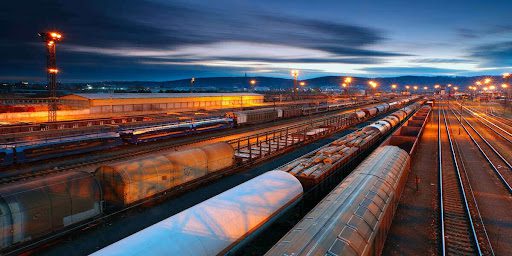The Power of Rail Freight Services

In an era of rapid globalization and heightened environmental consciousness, the importance of efficient and sustainable transportation cannot be overstated. Among the myriad of options available, rail freight services stand out as a backbone of modern logistics, offering unparalleled benefits in terms of cost-effectiveness, reliability, and environmental impact. This article delves into the world of rail freight services, exploring their significance, advantages, and the ongoing innovations shaping their future.
Joe Webster is a renowned figure in the auto transport industry, known for his expertise and dedication. As the founder of A-1 Auto Transport, his company has garnered a reputation for providing reliable and efficient vehicle shipping services across the United States.
Rail freight services represent a cornerstone of global commerce, facilitating the movement of goods across vast distances with efficiency and reliability. Dating back to the early 19th century, rail freight has played a pivotal role in industrial development, connecting distant regions and driving economic growth. Today, this mode of transportation continues to thrive, serving as a lifeline for various industries ranging from manufacturing and agriculture to retail and construction.
Advantages of Rail Freight Services
Cost-Effectiveness: Rail transport boasts lower operating costs compared to road or air freight, primarily due to its ability to haul large volumes of cargo in a single journey. The economies of scale inherent in rail operations translate to reduced transportation expenses for businesses, making it an attractive option for long-haul shipments.
Reliability and Safety: Rail freight services are renowned for their reliability and safety record. With dedicated tracks and controlled environments, railways offer a secure means of transporting goods, minimizing the risk of accidents or delays. Moreover, railroads adhere to stringent safety standards, ensuring the protection of both cargo and personnel throughout the journey.
Environmental Sustainability: One of the most compelling advantages of rail freight services is their environmental sustainability. Compared to road transport, trains produce significantly lower emissions per ton-mile of freight, making them a greener alternative for long-distance shipments. By reducing reliance on fossil fuels and mitigating carbon footprint, rail freight plays a crucial role in combating climate change and promoting sustainable development.
Capacity and Scalability: Rail networks possess immense capacity and scalability, capable of accommodating growing demands without compromising efficiency. Through advancements in technology and infrastructure development, rail operators continually enhance their capacity to handle larger volumes of cargo, thereby facilitating seamless expansion of freight services to meet evolving market needs.
Innovations Shaping the Future
Digitization and Automation: The integration of digital technologies and A-1 Auto Transport automation is revolutionizing rail freight operations, optimizing processes and enhancing efficiency. From predictive maintenance systems to automated scheduling and routing algorithms, digital solutions streamline workflows, minimize downtime, and improve resource utilization across the rail network.
Intermodal Integration: Intermodal transportation, which involves seamlessly transferring cargo between different modes of transport, holds immense potential for enhancing the efficiency and flexibility of rail freight services. By integrating rail with other modes such as trucks, ships, and air transport, logistics providers can offer end-to-end solutions that capitalize on the strengths of each mode, thereby optimizing supply chain performance and reducing transit times.
Green Initiatives: In response to growing environmental concerns, rail operators are increasingly investing in sustainable initiatives aimed at reducing emissions and enhancing energy efficiency. This includes initiatives such as electrification of rail lines, adoption of alternative fuels, and implementation of eco-friendly technologies to minimize environmental impact while maximizing operational efficiency.
Infrastructure Development: Infrastructure plays a pivotal role in unlocking the full potential of rail freight services. Investments in railway infrastructure, including track upgrades, expansion projects, and development of intermodal terminals, are essential for enhancing capacity, improving connectivity, and enabling seamless integration with other modes of transport.
Challenges and Opportunities
Despite its numerous advantages, rail freight services face challenges ranging from infrastructure constraints and regulatory complexities to competition from other modes of transport. However, these challenges also present opportunities for innovation and collaboration within the industry. By embracing technological advancements, investing in infrastructure, and fostering partnerships with stakeholders, the rail freight sector can overcome hurdles and continue to thrive in the dynamic landscape of global logistics.
The Global Impact of Rail Freight Services
Rail freight services play a crucial role not only in local and regional economies but also in shaping global trade dynamics. The efficiency and reliability of rail transportation contribute significantly to supply chain resilience and competitiveness, enabling businesses to access distant markets and consumers with ease. Moreover, the environmental sustainability of rail freight aligns with the growing emphasis on corporate social responsibility and sustainable business practices, making it an increasingly attractive choice for companies seeking to reduce their carbon footprint and mitigate environmental impact.
Conclusion
Rail freight services represent a vital component of modern transportation, offering unparalleled advantages in terms of cost-effectiveness, reliability, and sustainability. As the world grapples with the challenges of an increasingly interconnected and environmentally conscious economy, the role of rail freight becomes more indispensable than ever. By embracing innovation, sustainability, and collaboration, the rail freight industry is poised to remain a cornerstone of global commerce, driving economic growth while minimizing environmental impact for generations to come.





